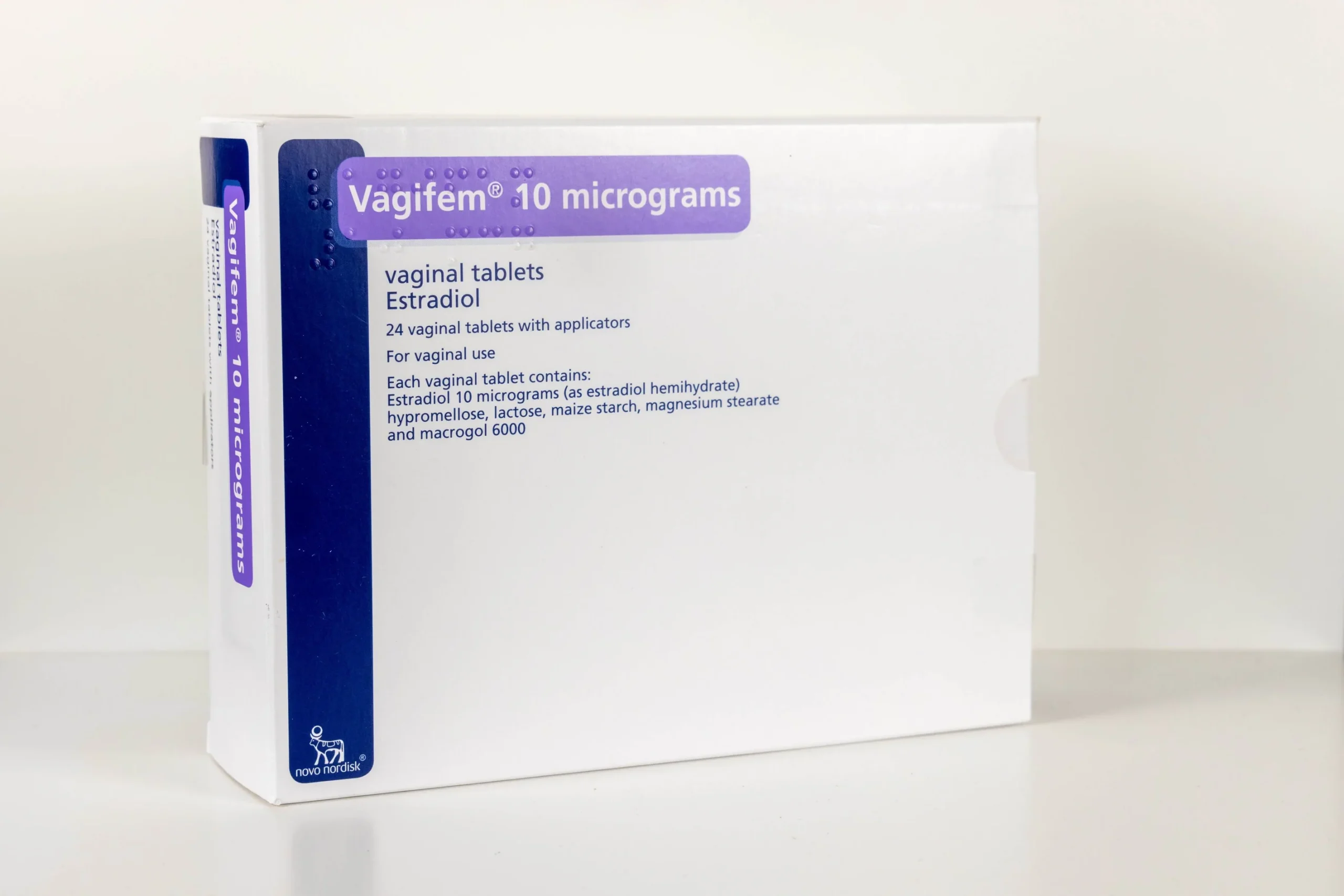Vagifem and Weight Loss: Facts, Not Folklore
What Vagifem Is
Vagifem is low-dose vaginal oestrogen (estradiol) prescribed for urogenital symptoms such as dryness, irritation and pain. It is used locally, via a small tablet inserted into the vagina with an applicator, usually twice weekly after a short daily “loading” phase. It is designed for symptom relief – not for changing body weight.

Does Vagifem Affect Weight?
Short answer – there is no good evidence that Vagifem causes weight loss. Vaginal oestrogen delivers tiny amounts of hormone to the local tissues, with minimal systemic absorption at low doses. Because bloodstream levels remain low, effects on body weight are unlikely to be meaningful. That is why vaginal oestrogen generally does not require progestogen for endometrial protection.
You may still read anecdotes about “Vagifem weight loss” or “weight gain”. Be cautious. Weight often shifts around the menopause for many reasons that have little to do with HRT. UK guidance repeatedly notes there is little evidence that HRT per se makes you put on weight.
Why Weight Changes Around Menopause
Ageing reduces lean muscle mass. Resting energy use falls. Sleep can worsen. Appetite signals wobble. Oestrogen decline also nudges fat distribution toward the waist. The result is a slow, stubborn creep rather than a sudden leap. Reviews and patient-facing guidance reflect this broader picture and explain why many women report gain at midlife – with or without HRT.
What We Know about Absorption
Pharmacokinetic data show very low serum estradiol with low/ultralow-dose vaginal products. Some studies report a small early spike when treatment starts (as the vaginal lining is thin), then low levels thereafter. Practically, it means local benefit with minimal whole-body exposure – again, not a platform for fat loss.
Side Effects – Where “Weight” Shows up
Official leaflets and reputable summaries list common local effects: discharge, spotting, breast tenderness, abdominal cramps, bloating or irritation. Some references include fluid retention and weight change as possible, usually rare or not well quantified. If it happens, it is more likely water than fat. Report persistent swelling, rapid shifts, or anything that worries you.
Vagifem for Weight Loss? No
Let’s be blunt. Vagifem is not licensed for weight management. HRT can make life easier – better sleep, fewer urinary and vaginal symptoms – which might indirectly help your routine, training and appetite. But using a local oestrogen as a slimming aid makes no clinical sense and is not supported by evidence.
How to Judge Claims You See Online
Red flags:
- Promises that any HRT will “melt belly fat”.
- Before/after pictures with no dates or details.
- Stories that never cite a leaflet, NHS page, or peer-reviewed data.
Green checks:
- Named product information (SmPC or patient leaflet).
- NHS, British Menopause Society, or Women’s Health Concern guidance.
- Trials that measure serum estradiol with clear methods, not blogs.
Practical Ways to Manage Weight While Using Vagifem
If weight is the goal, use tools that actually move the needle. Keep it simple and keepable.
Food – small levers, big pay-offs:
- Anchor meals with protein; add veg you’ll actually eat.
- Watch liquid calories – alcohol, sugary drinks, milky coffees.
- Build a small, steady calorie deficit you could follow for months.
Activity – routine beats heroics:
- Aim for 150 minutes of moderate activity a week, plus two short strength sessions.
- Walk daily. Short walks after meals help.
- Guard sleep – poor sleep pushes appetite and water retention.
None of this is glamorous. It works. And it plays well with HRT because feeling better makes it easier to stick to the plan.

My Take – Honestly
Vagifem treats local menopausal symptoms. It does that job well for many women, with low systemic exposure. It does not burn fat. If your weight goes down while using it, it will be because of diet, activity, sleep, stress – the usual suspects. If your weight goes up, check for normal midlife trends, fluid shifts, and changes in eating or movement. Don’t pin it all on a low-dose vaginal tablet.
If in doubt, talk to your prescriber. You can adjust dose, switch formulations, or add practical support around food and activity. Treat medicines for what they are; use habits for the rest.
Bottom Line
Vagifem is for vaginal and urinary symptoms – not for weight loss. Low-dose vaginal oestrogen is absorbed systemically at very low levels, so weight effects are unlikely and not an intended outcome. Menopause-related weight change is real, but the answer lives in behaviour, sleep and strength – with HRT helping comfort, not the scales. If anything about your weight or side-effects feels off, get individual advice rather than relying on internet folklore.
